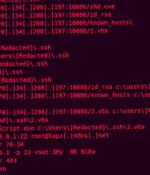Security News

An unnamed Islamic non-profit organization in Saudi Arabia has been targeted as part of a stealthy cyber espionage campaign designed to drop a previously undocumented backdoor called Zardoor....

At the time, Abouammo was facing up to 20 years behind bars for, while working for Twitter in the US, leaking to Saudi Arabia sensitive information about 6,000 Twitter accounts that could be used to identify and locate users who were of interest to the Saudi royals. Instead, a judge this week sentenced Abouammo to 42 months in federal prison followed by three years of supervised release.

A former Twitter employee who was found guilty of spying on behalf of Saudi Arabia by sharing data pertaining to specific individuals has been sentenced to three-and-a-half years in prison. Ahmad Abouammo, 45, was convicted earlier this August on various criminal counts, including money laundering, fraud, falsifying records, and being an illegal agent of a foreign government.

A former Twitter employee has been pronounced guilty for his role in digging up private information pertaining to certain Twitter users and turning over that data to Saudi Arabia. Ahmad Abouammo, 44, was convicted by a jury after a two-week trial in San Francisco federal court, Bloomberg reported Tuesday.

Russia, Iran and Saudi Arabia are the top three proliferators of state-linked Twitter misinformation campaigns, according to a report released Wednesday by the Australian Strategic Policy Institute. The think tank's International Cyber Policy Centre report and corresponding website examined datasets in Twitter's Information Operations Archive to understand state willingness, capability and intent to drive disinformation campaigns.

A state-sponsored threat actor allegedly affiliated with Iran has been linked to a series of targeted attacks aimed at internet service providers and telecommunication operators in Israel, Morocco, Tunisia, and Saudi Arabia, as well as a ministry of foreign affairs in Africa, new findings reveal. The intrusions, staged by a group tracked as Lyceum, are believed to have occurred between July and October 2021, researchers from Accenture Cyber Threat Intelligence group and Prevailion's Adversarial Counterintelligence Team said in a technical report.

The iPhone of New York Times journalist Ben Hubbard was repeatedly hacked with NSO Group's Pegasus spyware tool over a three-year period stretching between June 2018 to June 2021, resulting in infections twice in July 2020 and June 2021. In a statement shared with Hubbard, the Israeli company denied its involvement in the hacks and dismissed the findings as "Speculation," while noting that the journalist was not "a target of Pegasus by any of NSO's customers."

Saudi Arabia's state oil giant acknowledged Wednesday that leaked data from the company - files now apparently being used in a cyber-extortion attempt involving a $50 million ransom demand - likely came from one of its contractors. The Saudi Arabian Oil Co., better known as Saudi Aramco, told The Associated Press that it "Recently became aware of the indirect release of a limited amount of company data which was held by third-party contractors."

Attackers have stolen 1 TB of proprietary data belonging to Saudi Aramco and are offering it for sale on the darknet. Saudi Aramco has pinned this data incident on third-party contractors and tells BleepingComputer that the incident had no impact on Aramco's operations.

The United Nations International Telecommunication Union published its 2020 Global Cyber Security Index on Tuesday, and listed the US first in overall ranking, followed by a tie for second place tie between the UK and Saudi Arabia. The index ranks nations using 82 questions developed by a panel of experts.